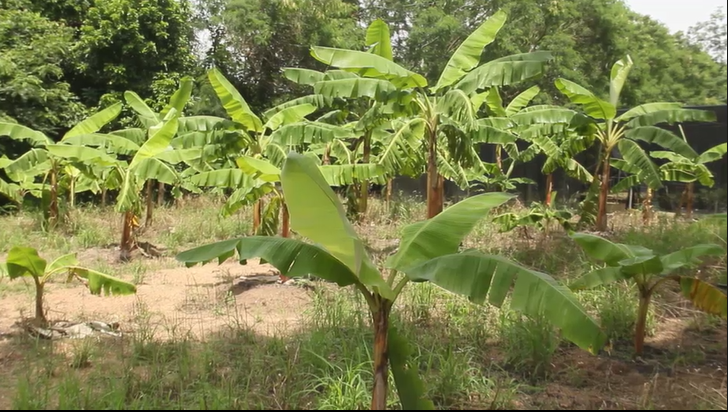A recent study by scientists has revealed a current high incidence of sun's ultraviolet rays has positive effects on plantain production.
The findings reveal the sun's UV rays can cause plant growth patterns to respond to the intensity of light as well as genetic and physiological changes in plants resulting in an increase in pro-vitamin A carotenoids content.
Plant physiologist and Principal Research Scientist at CRI-CSIR, Prof Beloved Mensah Dzomeku says the study shows climate change with it's accompanying complexities could have a positive effect on some plant secondary metabolites and improve the nutritional content of others.
He says various plants respond differently to the effects of climate change.
Vitamin A is essential for many processes in a human body, including healthy vision, normal function of the immune system, and organs. It also aids proper growth and development of babies in the womb.
The vitamin is needed to convert light that hits one's eye into an electrical signal that can be sent to the brain.
One of the first symptoms of vitamin A deficiency can be night blindness.
Prof Dzomeku observes throughout the study that carotenoids are precursors for norisoprenoid compounds in grapes, hence suggesting that the sun's UV rays may also affect the grape and wine flavour.
He says understanding the mechanisms by which physiological processes are damaged, repaired, or protected is therefore important to explain the relationship between plants, environment, and sun's UV rays in enhancing carotenoid levels in fruits.
The sun's UV index was studied for two consecutive years using Accuweather satellite to record daily readings.
Between November and May within the period of study, the sun's UV index was higher which mostly coincide with the dry and beginning of rainy seasons.
Average minimum and maximum temperatures range between 27 degrees Celsius and 39 degrees Celsius.
During the rainy seasons, between June and October same period, it was however relatively lower.
Average minimum and maximum temperatures range between 25 degrees Celsius and 28 degrees Celsius.
The relative humidity during dry periods were between 25% and 35% while wet periods experienced from 75 percent to 80 percent.
The study reveals that periods of high levels of sun's UV index coincided with high levels of provitamin A in plantain.
Professor Dzomeku says though climate change could have a negative impact on other plants, it clearly helps in the case of plantain especially when they are already grown.
The situation, he says, however, is different from plantain plants that are still young. The sun's high UV index affects the photosynthetic apparatus of the young plantain.
He says they begin to wilt due to the high incidence of the high UV index but do better under 60 percent shade.
Professor Dzomeku is advising farmers to take advantage of the study to enhance their production
He also wants staff of the Ministry of Food and Agriculture (MoFA) especially those who work directly with farmers to share the current finding with them to increase production.
Latest Stories
-
NPP govt was living ‘champagne lifestyle on Akepeteshie budget’ – Finance Minister Ato Forson rebukes
9 minutes -
Rwanda’s Kagame appoints central banker as new prime minister
13 minutes -
Mahama running an optics and settings government – Sammi Awuku
17 minutes -
Parliament approves bill to scrap marine gas oil subsidy
19 minutes -
Discipline, not rhetoric stabilised the cedi – Ato Forson jabs Bawumia
20 minutes -
Parliament’s Appointments Committee to vet final Deputy Minister nominees today
29 minutes -
Hospital worker arrested over assault of patient
1 hour -
Starmer urged by MPs to recognise Palestinian state
1 hour -
Streeting vows to keep NHS services running as doctor strike begins
2 hours -
You had 8 years, why didn’t you fix it? – Ato Forson questions Bawumia’s legacy
2 hours -
I won’t boast like Bawumia – Ato Forson distances himself from cedi ‘arrest’ politics
2 hours -
No gold changed hands – Ato Forson shreds NPP’s Gold-for-Oil policy
3 hours -
Gold-for-Oil was a sham, BoG just paid in dollars, says Ato Forson
3 hours -
No such warning from IMF – Ato Forson rebuts NPP’s claim on BoG interventions for cedi stability
4 hours -
IMF never accused central bank of market interference – Finance Minister fires back
4 hours

